Academic Integrity, Skills Learned & Game Reflection - BMP3003
VerifiedAdded on 2023/06/14
|8
|2448
|341
Report
AI Summary
This report provides a comprehensive overview of academic integrity within the context of a Business Management course (BMP3003). It begins by defining academic integrity, emphasizing its importance in higher education, and discussing the implications of academic misconduct, including cheating, plagiarism, and falsification. The report then reflects on the skills acquired during the academic year, particularly those emphasized in the production of a game for Project 2, highlighting challenges encountered related to technology and creativity, and skills learned such as time management and critical thinking. The conclusion summarizes the importance of academic integrity and the value of the skills developed throughout the project. Desklib offers a platform for students to access this and other solved assignments for study purposes.
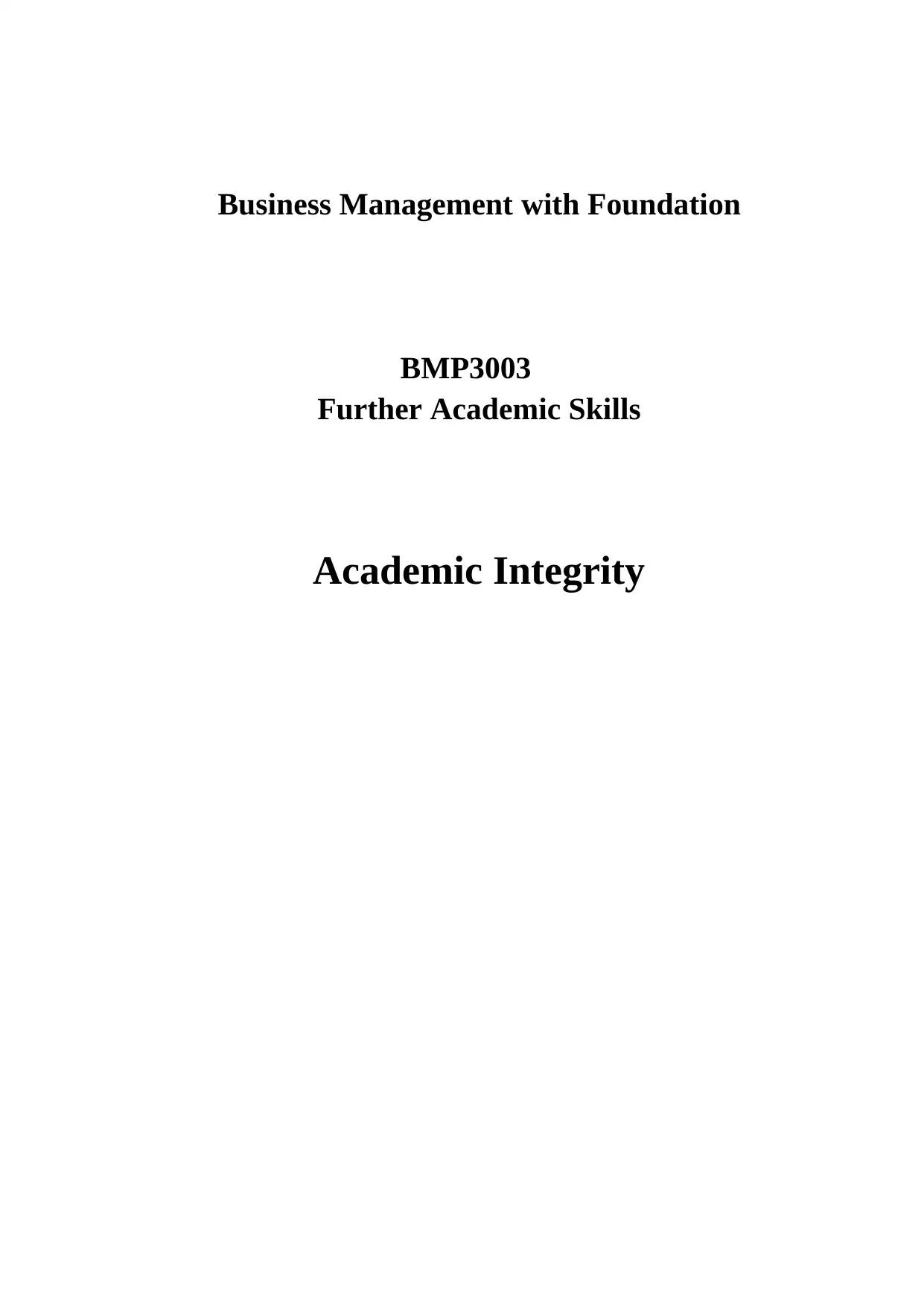
Business Management with Foundation
BMP3003
Further Academic Skills
Academic Integrity
BMP3003
Further Academic Skills
Academic Integrity
Paraphrase This Document
Need a fresh take? Get an instant paraphrase of this document with our AI Paraphraser
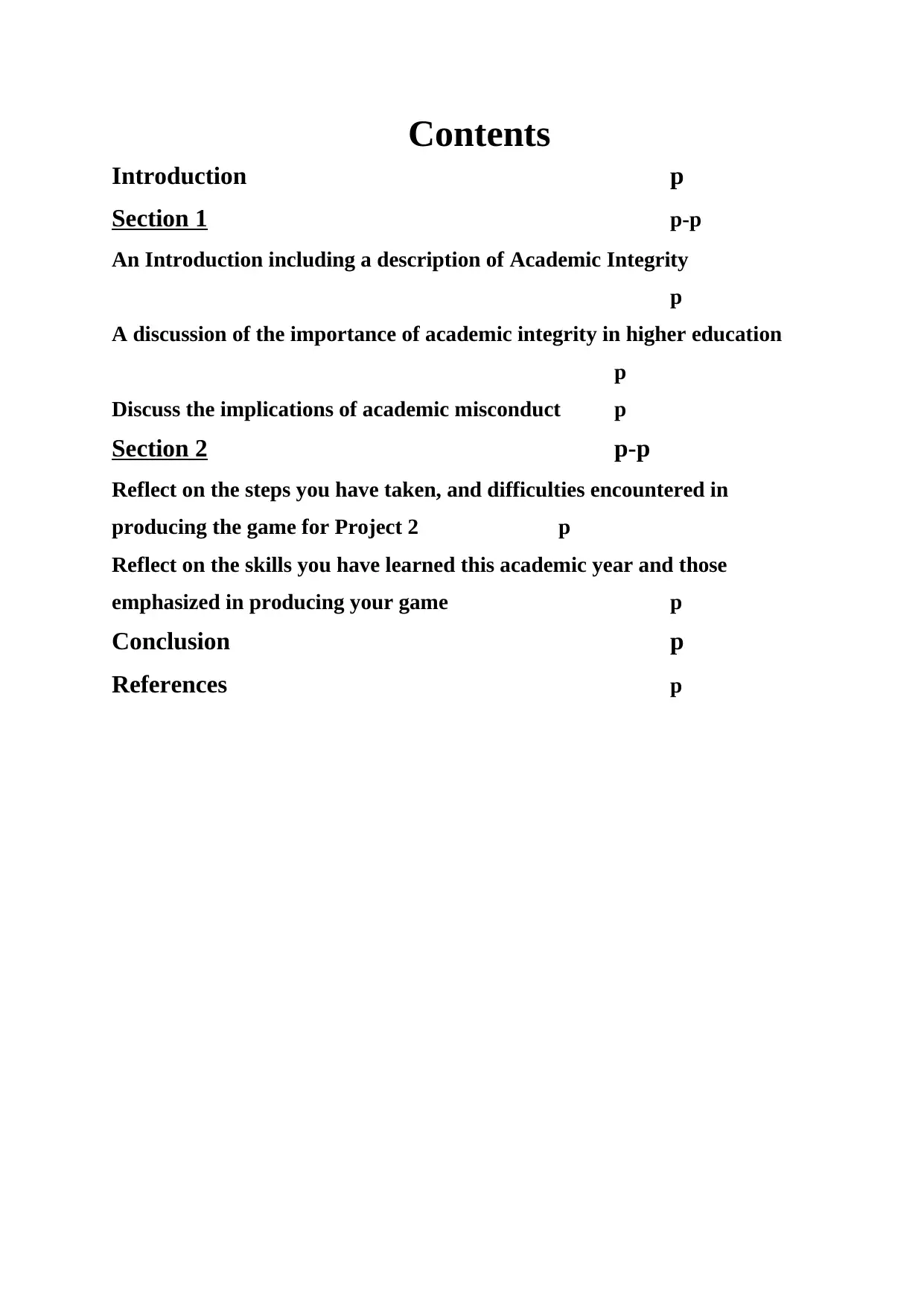
Contents
Introduction p
Section 1 p-p
An Introduction including a description of Academic Integrity
p
A discussion of the importance of academic integrity in higher education
p
Discuss the implications of academic misconduct p
Section 2 p-p
Reflect on the steps you have taken, and difficulties encountered in
producing the game for Project 2 p
Reflect on the skills you have learned this academic year and those
emphasized in producing your game p
Conclusion p
References p
Introduction p
Section 1 p-p
An Introduction including a description of Academic Integrity
p
A discussion of the importance of academic integrity in higher education
p
Discuss the implications of academic misconduct p
Section 2 p-p
Reflect on the steps you have taken, and difficulties encountered in
producing the game for Project 2 p
Reflect on the skills you have learned this academic year and those
emphasized in producing your game p
Conclusion p
References p
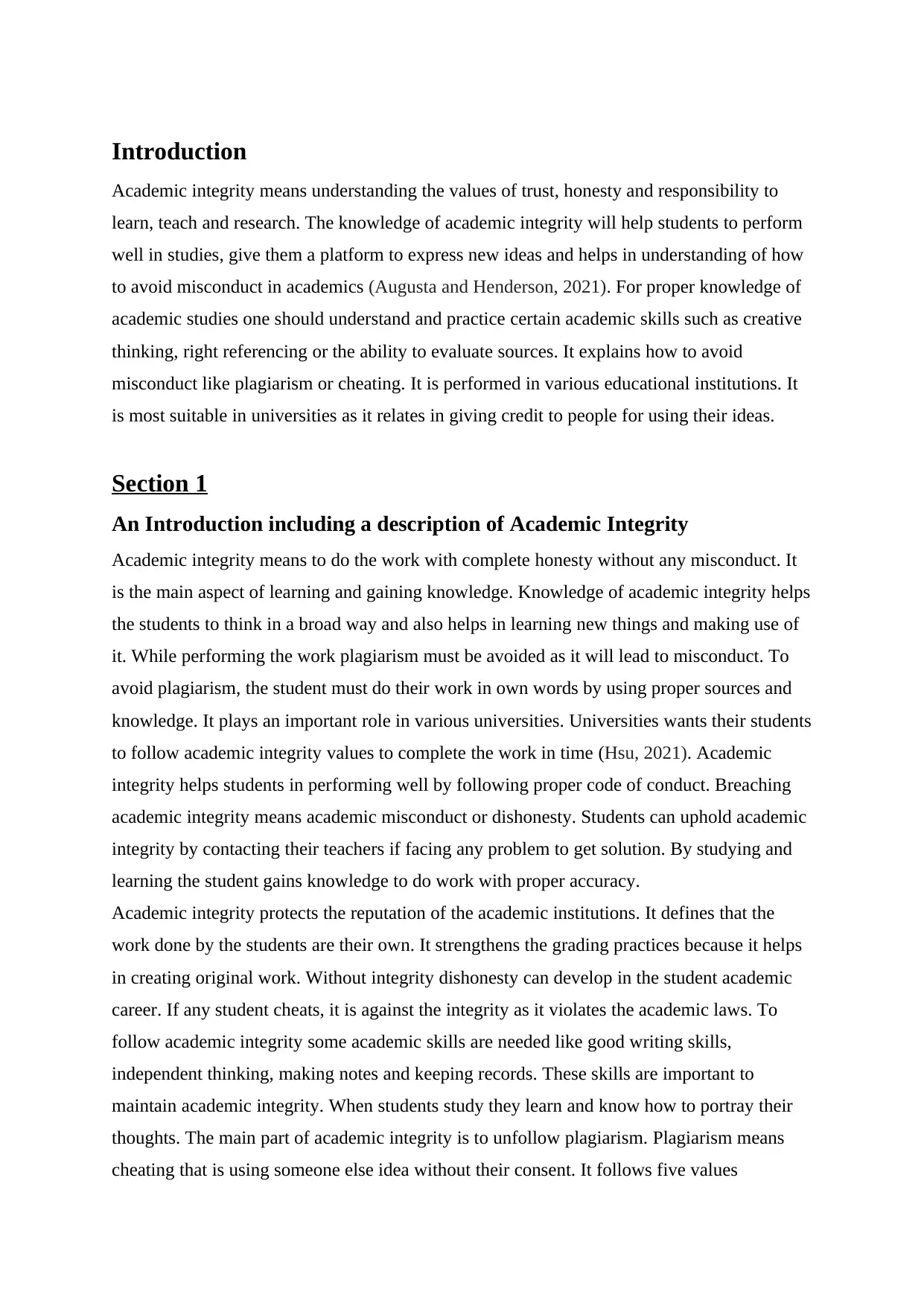
Introduction
Academic integrity means understanding the values of trust, honesty and responsibility to
learn, teach and research. The knowledge of academic integrity will help students to perform
well in studies, give them a platform to express new ideas and helps in understanding of how
to avoid misconduct in academics (Augusta and Henderson, 2021). For proper knowledge of
academic studies one should understand and practice certain academic skills such as creative
thinking, right referencing or the ability to evaluate sources. It explains how to avoid
misconduct like plagiarism or cheating. It is performed in various educational institutions. It
is most suitable in universities as it relates in giving credit to people for using their ideas.
Section 1
An Introduction including a description of Academic Integrity
Academic integrity means to do the work with complete honesty without any misconduct. It
is the main aspect of learning and gaining knowledge. Knowledge of academic integrity helps
the students to think in a broad way and also helps in learning new things and making use of
it. While performing the work plagiarism must be avoided as it will lead to misconduct. To
avoid plagiarism, the student must do their work in own words by using proper sources and
knowledge. It plays an important role in various universities. Universities wants their students
to follow academic integrity values to complete the work in time (Hsu, 2021). Academic
integrity helps students in performing well by following proper code of conduct. Breaching
academic integrity means academic misconduct or dishonesty. Students can uphold academic
integrity by contacting their teachers if facing any problem to get solution. By studying and
learning the student gains knowledge to do work with proper accuracy.
Academic integrity protects the reputation of the academic institutions. It defines that the
work done by the students are their own. It strengthens the grading practices because it helps
in creating original work. Without integrity dishonesty can develop in the student academic
career. If any student cheats, it is against the integrity as it violates the academic laws. To
follow academic integrity some academic skills are needed like good writing skills,
independent thinking, making notes and keeping records. These skills are important to
maintain academic integrity. When students study they learn and know how to portray their
thoughts. The main part of academic integrity is to unfollow plagiarism. Plagiarism means
cheating that is using someone else idea without their consent. It follows five values
Academic integrity means understanding the values of trust, honesty and responsibility to
learn, teach and research. The knowledge of academic integrity will help students to perform
well in studies, give them a platform to express new ideas and helps in understanding of how
to avoid misconduct in academics (Augusta and Henderson, 2021). For proper knowledge of
academic studies one should understand and practice certain academic skills such as creative
thinking, right referencing or the ability to evaluate sources. It explains how to avoid
misconduct like plagiarism or cheating. It is performed in various educational institutions. It
is most suitable in universities as it relates in giving credit to people for using their ideas.
Section 1
An Introduction including a description of Academic Integrity
Academic integrity means to do the work with complete honesty without any misconduct. It
is the main aspect of learning and gaining knowledge. Knowledge of academic integrity helps
the students to think in a broad way and also helps in learning new things and making use of
it. While performing the work plagiarism must be avoided as it will lead to misconduct. To
avoid plagiarism, the student must do their work in own words by using proper sources and
knowledge. It plays an important role in various universities. Universities wants their students
to follow academic integrity values to complete the work in time (Hsu, 2021). Academic
integrity helps students in performing well by following proper code of conduct. Breaching
academic integrity means academic misconduct or dishonesty. Students can uphold academic
integrity by contacting their teachers if facing any problem to get solution. By studying and
learning the student gains knowledge to do work with proper accuracy.
Academic integrity protects the reputation of the academic institutions. It defines that the
work done by the students are their own. It strengthens the grading practices because it helps
in creating original work. Without integrity dishonesty can develop in the student academic
career. If any student cheats, it is against the integrity as it violates the academic laws. To
follow academic integrity some academic skills are needed like good writing skills,
independent thinking, making notes and keeping records. These skills are important to
maintain academic integrity. When students study they learn and know how to portray their
thoughts. The main part of academic integrity is to unfollow plagiarism. Plagiarism means
cheating that is using someone else idea without their consent. It follows five values
⊘ This is a preview!⊘
Do you want full access?
Subscribe today to unlock all pages.

Trusted by 1+ million students worldwide
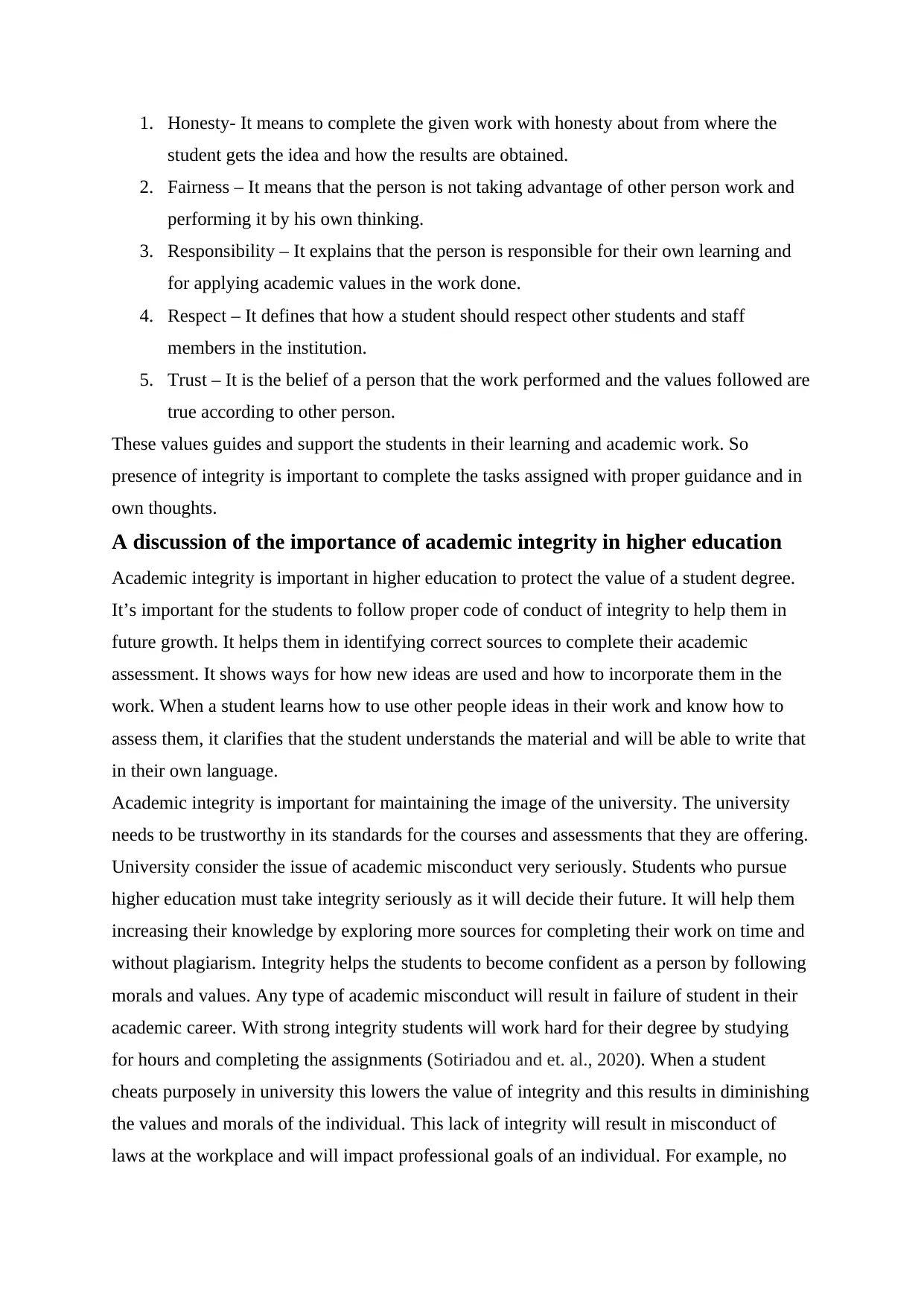
1. Honesty- It means to complete the given work with honesty about from where the
student gets the idea and how the results are obtained.
2. Fairness – It means that the person is not taking advantage of other person work and
performing it by his own thinking.
3. Responsibility – It explains that the person is responsible for their own learning and
for applying academic values in the work done.
4. Respect – It defines that how a student should respect other students and staff
members in the institution.
5. Trust – It is the belief of a person that the work performed and the values followed are
true according to other person.
These values guides and support the students in their learning and academic work. So
presence of integrity is important to complete the tasks assigned with proper guidance and in
own thoughts.
A discussion of the importance of academic integrity in higher education
Academic integrity is important in higher education to protect the value of a student degree.
It’s important for the students to follow proper code of conduct of integrity to help them in
future growth. It helps them in identifying correct sources to complete their academic
assessment. It shows ways for how new ideas are used and how to incorporate them in the
work. When a student learns how to use other people ideas in their work and know how to
assess them, it clarifies that the student understands the material and will be able to write that
in their own language.
Academic integrity is important for maintaining the image of the university. The university
needs to be trustworthy in its standards for the courses and assessments that they are offering.
University consider the issue of academic misconduct very seriously. Students who pursue
higher education must take integrity seriously as it will decide their future. It will help them
increasing their knowledge by exploring more sources for completing their work on time and
without plagiarism. Integrity helps the students to become confident as a person by following
morals and values. Any type of academic misconduct will result in failure of student in their
academic career. With strong integrity students will work hard for their degree by studying
for hours and completing the assignments (Sotiriadou and et. al., 2020). When a student
cheats purposely in university this lowers the value of integrity and this results in diminishing
the values and morals of the individual. This lack of integrity will result in misconduct of
laws at the workplace and will impact professional goals of an individual. For example, no
student gets the idea and how the results are obtained.
2. Fairness – It means that the person is not taking advantage of other person work and
performing it by his own thinking.
3. Responsibility – It explains that the person is responsible for their own learning and
for applying academic values in the work done.
4. Respect – It defines that how a student should respect other students and staff
members in the institution.
5. Trust – It is the belief of a person that the work performed and the values followed are
true according to other person.
These values guides and support the students in their learning and academic work. So
presence of integrity is important to complete the tasks assigned with proper guidance and in
own thoughts.
A discussion of the importance of academic integrity in higher education
Academic integrity is important in higher education to protect the value of a student degree.
It’s important for the students to follow proper code of conduct of integrity to help them in
future growth. It helps them in identifying correct sources to complete their academic
assessment. It shows ways for how new ideas are used and how to incorporate them in the
work. When a student learns how to use other people ideas in their work and know how to
assess them, it clarifies that the student understands the material and will be able to write that
in their own language.
Academic integrity is important for maintaining the image of the university. The university
needs to be trustworthy in its standards for the courses and assessments that they are offering.
University consider the issue of academic misconduct very seriously. Students who pursue
higher education must take integrity seriously as it will decide their future. It will help them
increasing their knowledge by exploring more sources for completing their work on time and
without plagiarism. Integrity helps the students to become confident as a person by following
morals and values. Any type of academic misconduct will result in failure of student in their
academic career. With strong integrity students will work hard for their degree by studying
for hours and completing the assignments (Sotiriadou and et. al., 2020). When a student
cheats purposely in university this lowers the value of integrity and this results in diminishing
the values and morals of the individual. This lack of integrity will result in misconduct of
laws at the workplace and will impact professional goals of an individual. For example, no
Paraphrase This Document
Need a fresh take? Get an instant paraphrase of this document with our AI Paraphraser
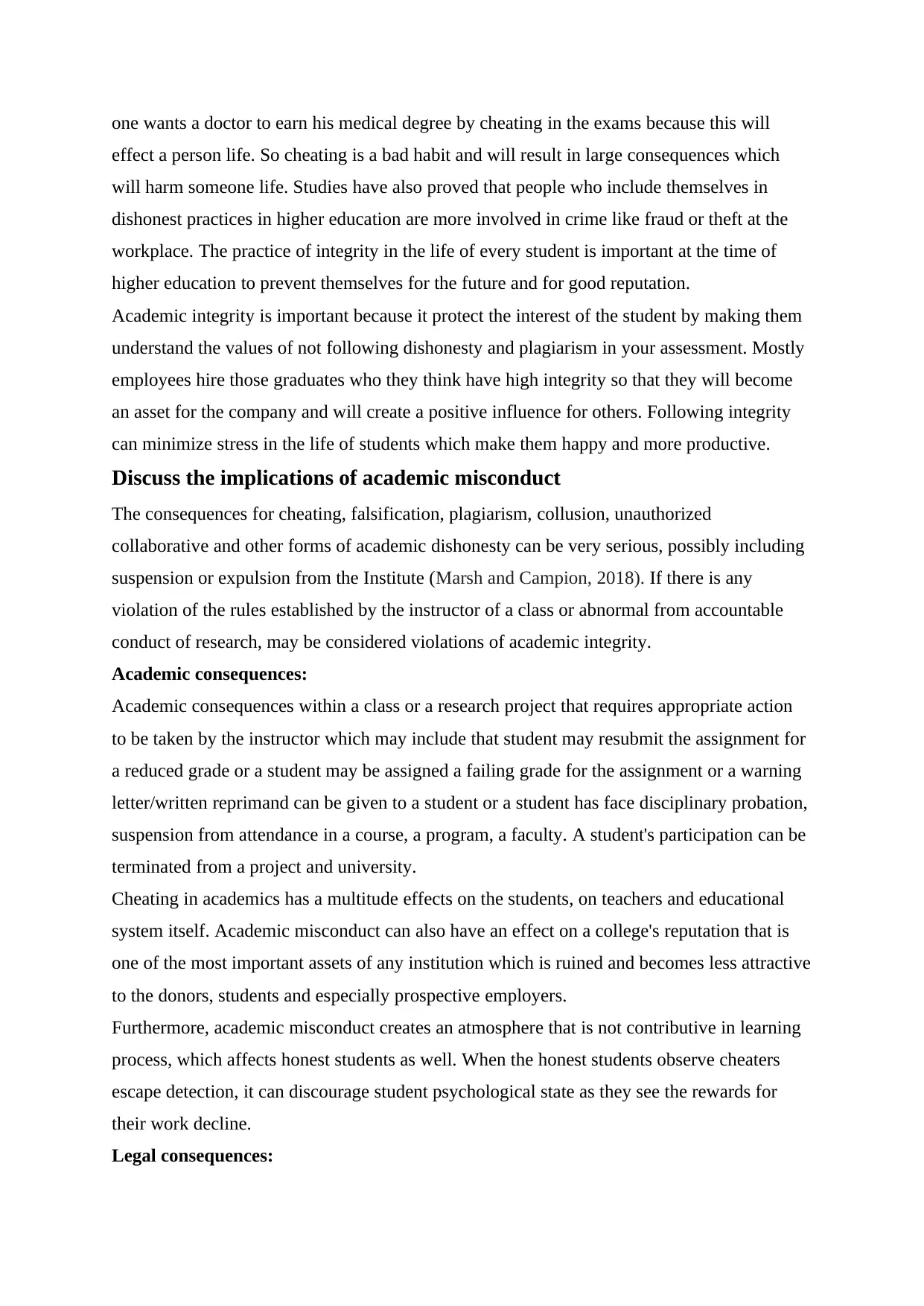
one wants a doctor to earn his medical degree by cheating in the exams because this will
effect a person life. So cheating is a bad habit and will result in large consequences which
will harm someone life. Studies have also proved that people who include themselves in
dishonest practices in higher education are more involved in crime like fraud or theft at the
workplace. The practice of integrity in the life of every student is important at the time of
higher education to prevent themselves for the future and for good reputation.
Academic integrity is important because it protect the interest of the student by making them
understand the values of not following dishonesty and plagiarism in your assessment. Mostly
employees hire those graduates who they think have high integrity so that they will become
an asset for the company and will create a positive influence for others. Following integrity
can minimize stress in the life of students which make them happy and more productive.
Discuss the implications of academic misconduct
The consequences for cheating, falsification, plagiarism, collusion, unauthorized
collaborative and other forms of academic dishonesty can be very serious, possibly including
suspension or expulsion from the Institute (Marsh and Campion, 2018). If there is any
violation of the rules established by the instructor of a class or abnormal from accountable
conduct of research, may be considered violations of academic integrity.
Academic consequences:
Academic consequences within a class or a research project that requires appropriate action
to be taken by the instructor which may include that student may resubmit the assignment for
a reduced grade or a student may be assigned a failing grade for the assignment or a warning
letter/written reprimand can be given to a student or a student has face disciplinary probation,
suspension from attendance in a course, a program, a faculty. A student's participation can be
terminated from a project and university.
Cheating in academics has a multitude effects on the students, on teachers and educational
system itself. Academic misconduct can also have an effect on a college's reputation that is
one of the most important assets of any institution which is ruined and becomes less attractive
to the donors, students and especially prospective employers.
Furthermore, academic misconduct creates an atmosphere that is not contributive in learning
process, which affects honest students as well. When the honest students observe cheaters
escape detection, it can discourage student psychological state as they see the rewards for
their work decline.
Legal consequences:
effect a person life. So cheating is a bad habit and will result in large consequences which
will harm someone life. Studies have also proved that people who include themselves in
dishonest practices in higher education are more involved in crime like fraud or theft at the
workplace. The practice of integrity in the life of every student is important at the time of
higher education to prevent themselves for the future and for good reputation.
Academic integrity is important because it protect the interest of the student by making them
understand the values of not following dishonesty and plagiarism in your assessment. Mostly
employees hire those graduates who they think have high integrity so that they will become
an asset for the company and will create a positive influence for others. Following integrity
can minimize stress in the life of students which make them happy and more productive.
Discuss the implications of academic misconduct
The consequences for cheating, falsification, plagiarism, collusion, unauthorized
collaborative and other forms of academic dishonesty can be very serious, possibly including
suspension or expulsion from the Institute (Marsh and Campion, 2018). If there is any
violation of the rules established by the instructor of a class or abnormal from accountable
conduct of research, may be considered violations of academic integrity.
Academic consequences:
Academic consequences within a class or a research project that requires appropriate action
to be taken by the instructor which may include that student may resubmit the assignment for
a reduced grade or a student may be assigned a failing grade for the assignment or a warning
letter/written reprimand can be given to a student or a student has face disciplinary probation,
suspension from attendance in a course, a program, a faculty. A student's participation can be
terminated from a project and university.
Cheating in academics has a multitude effects on the students, on teachers and educational
system itself. Academic misconduct can also have an effect on a college's reputation that is
one of the most important assets of any institution which is ruined and becomes less attractive
to the donors, students and especially prospective employers.
Furthermore, academic misconduct creates an atmosphere that is not contributive in learning
process, which affects honest students as well. When the honest students observe cheaters
escape detection, it can discourage student psychological state as they see the rewards for
their work decline.
Legal consequences:
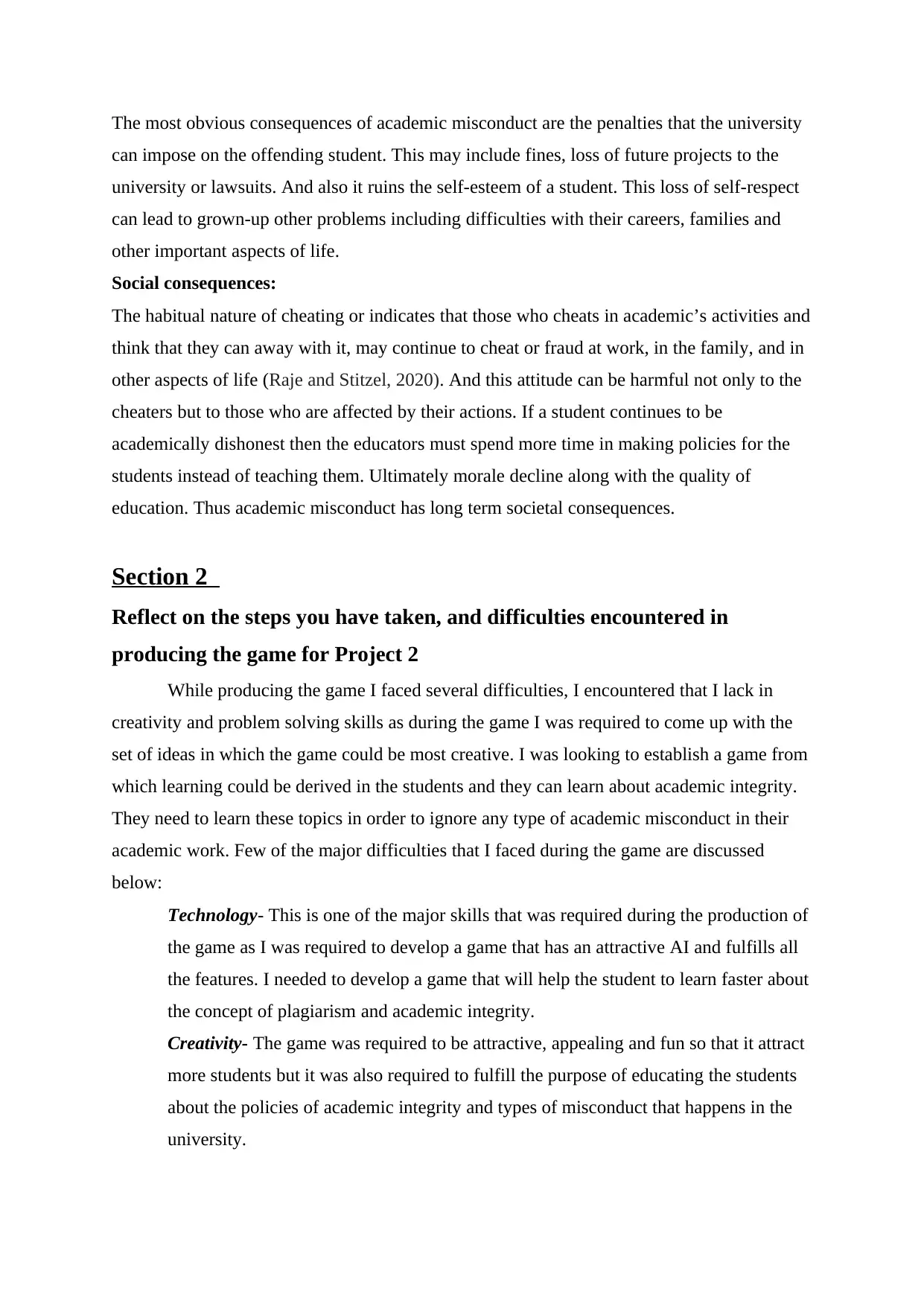
The most obvious consequences of academic misconduct are the penalties that the university
can impose on the offending student. This may include fines, loss of future projects to the
university or lawsuits. And also it ruins the self-esteem of a student. This loss of self-respect
can lead to grown-up other problems including difficulties with their careers, families and
other important aspects of life.
Social consequences:
The habitual nature of cheating or indicates that those who cheats in academic’s activities and
think that they can away with it, may continue to cheat or fraud at work, in the family, and in
other aspects of life (Raje and Stitzel, 2020). And this attitude can be harmful not only to the
cheaters but to those who are affected by their actions. If a student continues to be
academically dishonest then the educators must spend more time in making policies for the
students instead of teaching them. Ultimately morale decline along with the quality of
education. Thus academic misconduct has long term societal consequences.
Section 2
Reflect on the steps you have taken, and difficulties encountered in
producing the game for Project 2
While producing the game I faced several difficulties, I encountered that I lack in
creativity and problem solving skills as during the game I was required to come up with the
set of ideas in which the game could be most creative. I was looking to establish a game from
which learning could be derived in the students and they can learn about academic integrity.
They need to learn these topics in order to ignore any type of academic misconduct in their
academic work. Few of the major difficulties that I faced during the game are discussed
below:
Technology- This is one of the major skills that was required during the production of
the game as I was required to develop a game that has an attractive AI and fulfills all
the features. I needed to develop a game that will help the student to learn faster about
the concept of plagiarism and academic integrity.
Creativity- The game was required to be attractive, appealing and fun so that it attract
more students but it was also required to fulfill the purpose of educating the students
about the policies of academic integrity and types of misconduct that happens in the
university.
can impose on the offending student. This may include fines, loss of future projects to the
university or lawsuits. And also it ruins the self-esteem of a student. This loss of self-respect
can lead to grown-up other problems including difficulties with their careers, families and
other important aspects of life.
Social consequences:
The habitual nature of cheating or indicates that those who cheats in academic’s activities and
think that they can away with it, may continue to cheat or fraud at work, in the family, and in
other aspects of life (Raje and Stitzel, 2020). And this attitude can be harmful not only to the
cheaters but to those who are affected by their actions. If a student continues to be
academically dishonest then the educators must spend more time in making policies for the
students instead of teaching them. Ultimately morale decline along with the quality of
education. Thus academic misconduct has long term societal consequences.
Section 2
Reflect on the steps you have taken, and difficulties encountered in
producing the game for Project 2
While producing the game I faced several difficulties, I encountered that I lack in
creativity and problem solving skills as during the game I was required to come up with the
set of ideas in which the game could be most creative. I was looking to establish a game from
which learning could be derived in the students and they can learn about academic integrity.
They need to learn these topics in order to ignore any type of academic misconduct in their
academic work. Few of the major difficulties that I faced during the game are discussed
below:
Technology- This is one of the major skills that was required during the production of
the game as I was required to develop a game that has an attractive AI and fulfills all
the features. I needed to develop a game that will help the student to learn faster about
the concept of plagiarism and academic integrity.
Creativity- The game was required to be attractive, appealing and fun so that it attract
more students but it was also required to fulfill the purpose of educating the students
about the policies of academic integrity and types of misconduct that happens in the
university.
⊘ This is a preview!⊘
Do you want full access?
Subscribe today to unlock all pages.

Trusted by 1+ million students worldwide
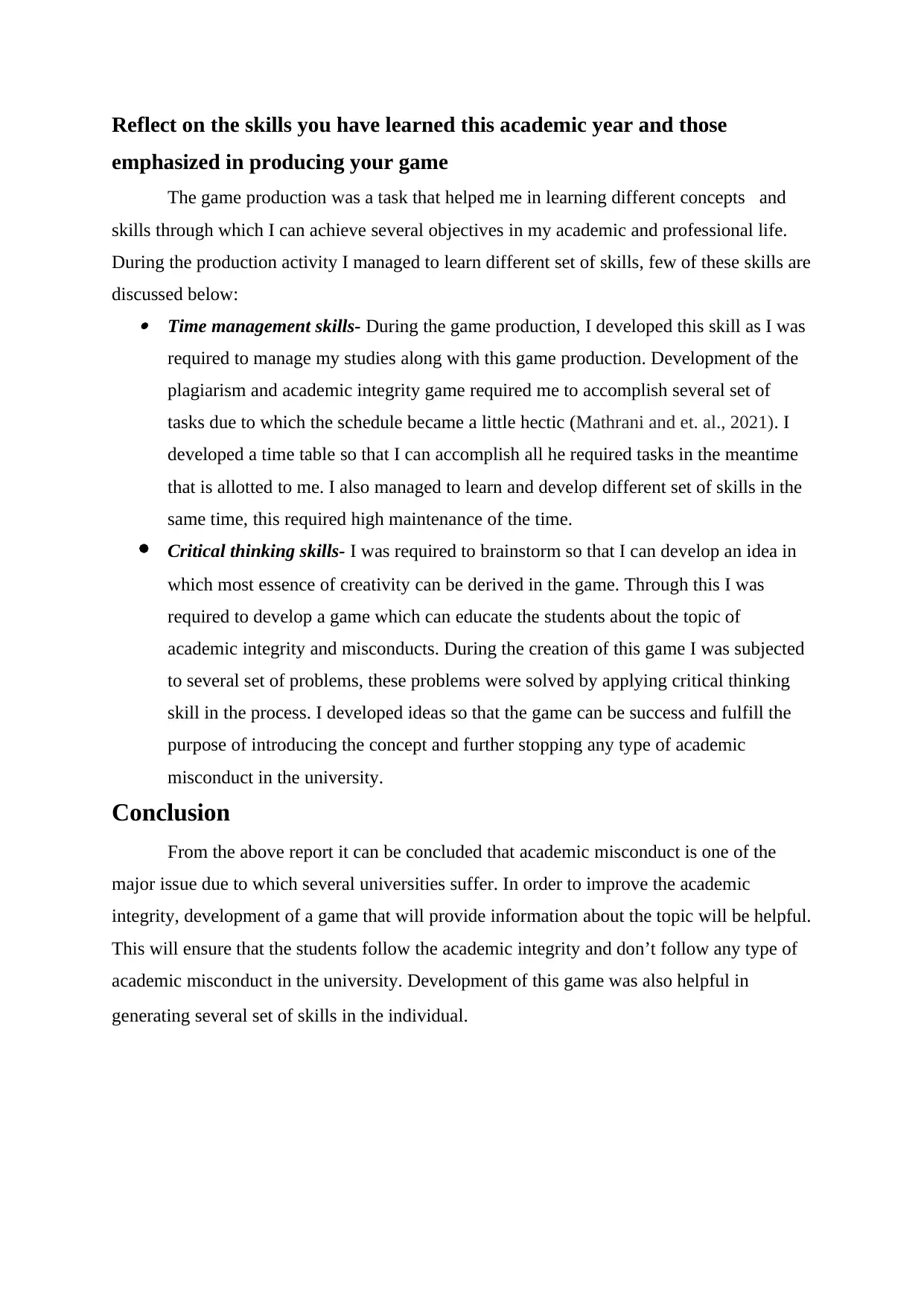
Reflect on the skills you have learned this academic year and those
emphasized in producing your game
The game production was a task that helped me in learning different concepts and
skills through which I can achieve several objectives in my academic and professional life.
During the production activity I managed to learn different set of skills, few of these skills are
discussed below: Time management skills- During the game production, I developed this skill as I was
required to manage my studies along with this game production. Development of the
plagiarism and academic integrity game required me to accomplish several set of
tasks due to which the schedule became a little hectic (Mathrani and et. al., 2021). I
developed a time table so that I can accomplish all he required tasks in the meantime
that is allotted to me. I also managed to learn and develop different set of skills in the
same time, this required high maintenance of the time.
Critical thinking skills- I was required to brainstorm so that I can develop an idea in
which most essence of creativity can be derived in the game. Through this I was
required to develop a game which can educate the students about the topic of
academic integrity and misconducts. During the creation of this game I was subjected
to several set of problems, these problems were solved by applying critical thinking
skill in the process. I developed ideas so that the game can be success and fulfill the
purpose of introducing the concept and further stopping any type of academic
misconduct in the university.
Conclusion
From the above report it can be concluded that academic misconduct is one of the
major issue due to which several universities suffer. In order to improve the academic
integrity, development of a game that will provide information about the topic will be helpful.
This will ensure that the students follow the academic integrity and don’t follow any type of
academic misconduct in the university. Development of this game was also helpful in
generating several set of skills in the individual.
emphasized in producing your game
The game production was a task that helped me in learning different concepts and
skills through which I can achieve several objectives in my academic and professional life.
During the production activity I managed to learn different set of skills, few of these skills are
discussed below: Time management skills- During the game production, I developed this skill as I was
required to manage my studies along with this game production. Development of the
plagiarism and academic integrity game required me to accomplish several set of
tasks due to which the schedule became a little hectic (Mathrani and et. al., 2021). I
developed a time table so that I can accomplish all he required tasks in the meantime
that is allotted to me. I also managed to learn and develop different set of skills in the
same time, this required high maintenance of the time.
Critical thinking skills- I was required to brainstorm so that I can develop an idea in
which most essence of creativity can be derived in the game. Through this I was
required to develop a game which can educate the students about the topic of
academic integrity and misconducts. During the creation of this game I was subjected
to several set of problems, these problems were solved by applying critical thinking
skill in the process. I developed ideas so that the game can be success and fulfill the
purpose of introducing the concept and further stopping any type of academic
misconduct in the university.
Conclusion
From the above report it can be concluded that academic misconduct is one of the
major issue due to which several universities suffer. In order to improve the academic
integrity, development of a game that will provide information about the topic will be helpful.
This will ensure that the students follow the academic integrity and don’t follow any type of
academic misconduct in the university. Development of this game was also helpful in
generating several set of skills in the individual.
Paraphrase This Document
Need a fresh take? Get an instant paraphrase of this document with our AI Paraphraser
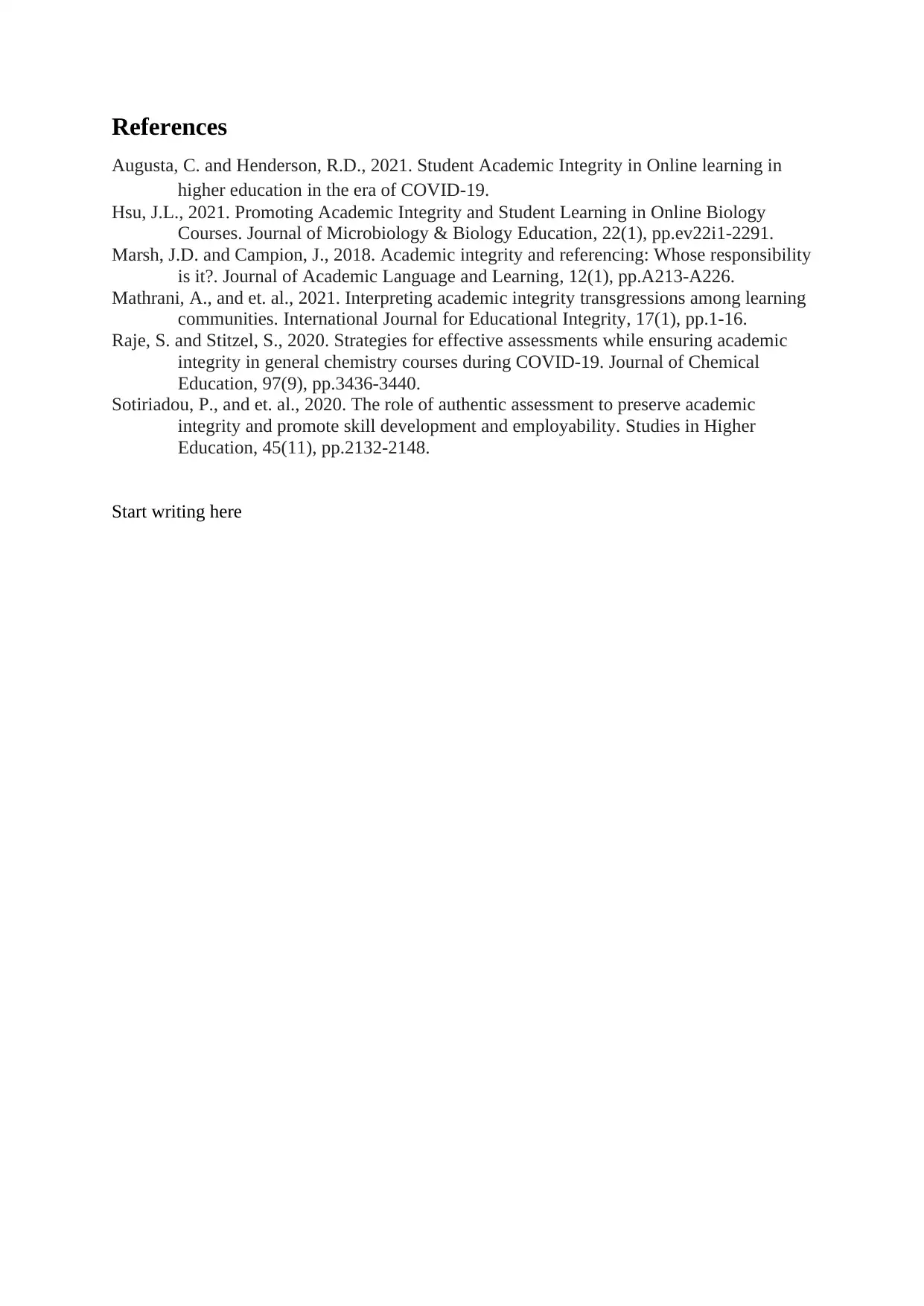
References
Augusta, C. and Henderson, R.D., 2021. Student Academic Integrity in Online learning in
higher education in the era of COVID-19.
Hsu, J.L., 2021. Promoting Academic Integrity and Student Learning in Online Biology
Courses. Journal of Microbiology & Biology Education, 22(1), pp.ev22i1-2291.
Marsh, J.D. and Campion, J., 2018. Academic integrity and referencing: Whose responsibility
is it?. Journal of Academic Language and Learning, 12(1), pp.A213-A226.
Mathrani, A., and et. al., 2021. Interpreting academic integrity transgressions among learning
communities. International Journal for Educational Integrity, 17(1), pp.1-16.
Raje, S. and Stitzel, S., 2020. Strategies for effective assessments while ensuring academic
integrity in general chemistry courses during COVID-19. Journal of Chemical
Education, 97(9), pp.3436-3440.
Sotiriadou, P., and et. al., 2020. The role of authentic assessment to preserve academic
integrity and promote skill development and employability. Studies in Higher
Education, 45(11), pp.2132-2148.
Start writing here
Augusta, C. and Henderson, R.D., 2021. Student Academic Integrity in Online learning in
higher education in the era of COVID-19.
Hsu, J.L., 2021. Promoting Academic Integrity and Student Learning in Online Biology
Courses. Journal of Microbiology & Biology Education, 22(1), pp.ev22i1-2291.
Marsh, J.D. and Campion, J., 2018. Academic integrity and referencing: Whose responsibility
is it?. Journal of Academic Language and Learning, 12(1), pp.A213-A226.
Mathrani, A., and et. al., 2021. Interpreting academic integrity transgressions among learning
communities. International Journal for Educational Integrity, 17(1), pp.1-16.
Raje, S. and Stitzel, S., 2020. Strategies for effective assessments while ensuring academic
integrity in general chemistry courses during COVID-19. Journal of Chemical
Education, 97(9), pp.3436-3440.
Sotiriadou, P., and et. al., 2020. The role of authentic assessment to preserve academic
integrity and promote skill development and employability. Studies in Higher
Education, 45(11), pp.2132-2148.
Start writing here
1 out of 8
Related Documents
Your All-in-One AI-Powered Toolkit for Academic Success.
+13062052269
info@desklib.com
Available 24*7 on WhatsApp / Email
![[object Object]](/_next/static/media/star-bottom.7253800d.svg)
Unlock your academic potential
Copyright © 2020–2026 A2Z Services. All Rights Reserved. Developed and managed by ZUCOL.



